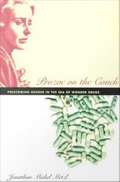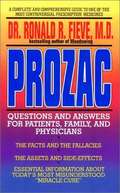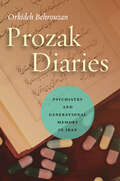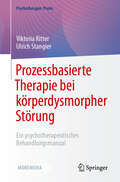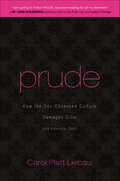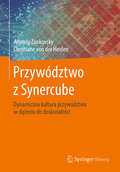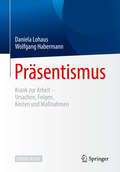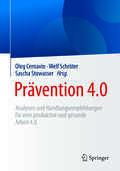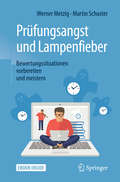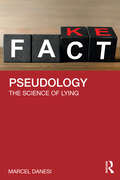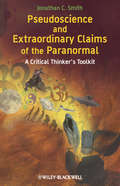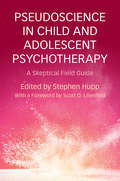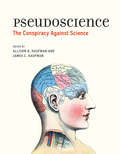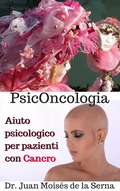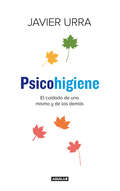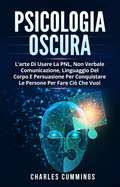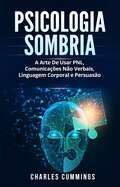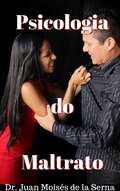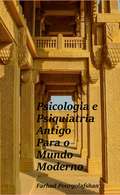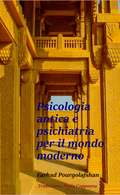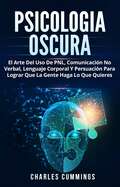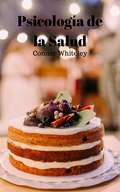- Table View
- List View
Prozac on the Couch: Prescribing Gender in the Era of Wonder Drugs
by Jonathan Michel MetzlPills replaced the couch; neuroscience took the place of talk therapy; and as psychoanalysis faded from the scene, so did the castrating mothers and hysteric spinsters of Freudian theory. Or so the story goes. In Prozac on the Couch, psychiatrist Jonathan Michel Metzl boldly challenges recent psychiatric history, showing that there's a lot of Dr. Freud encapsulated in late-twentieth-century psychotropic medications. Providing a cultural history of treatments for depression, anxiety, and other mental illnesses through a look at the professional and popular reception of three "wonder drugs"--Miltown, Valium, and Prozac--Metzl explains the surprising ways Freudian gender categories and popular gender roles have shaped understandings of these drugs. Prozac on the Couch traces the notion of "pills for everyday worries" from the 1950s to the early twenty-first century, through psychiatric and medical journals, popular magazine articles, pharmaceutical advertisements, and popular autobiographical "Prozac narratives. " Metzl shows how clinical and popular talk about these medications often reproduces all the cultural and social baggage associated with psychoanalytic paradigms--whether in a 1956 Cosmopolitan article about research into tranquilizers to "cure" frigid women; a 1970s American Journal of Psychiatry ad introducing Jan, a lesbian who "needs" Valium to find a man; or Peter Kramer's description of how his patient "Mrs. Prozac" meets her husband after beginning treatment. Prozac on the Couch locates the origins of psychiatry's "biological revolution" not in the Valiumania of the 1970s but in American popular culture of the 1950s. It was in the 1950s, Metzl points out, that traditional psychoanalysis had the most sway over the American imagination. As the number of Miltown prescriptions soared (reaching 35 million, or nearly one per second, in 1957), advertisements featuring uncertain brides and unfaithful wives miraculously cured by the "new" psychiatric medicines filled popular magazines. Metzl writes without nostalgia for the bygone days of Freudian psychoanalysis and without contempt for psychotropic drugs, which he himself regularly prescribes to his patients. What he urges is an increased self-awareness within the psychiatric community of the ways that Freudian ideas about gender are entangled in Prozac and each new generation of wonder drugs. He encourages, too, an understanding of how ideas about psychotropic medications have suffused popular culture and profoundly altered the relationship between doctors and patients.
Prozac: Questions and Answers
by Ronald R. FieveFeatured on the cover of "Newsweek" and "New York Magazine. ". . debated on television and radio, written about in daily newspapers, "Prozac has raised hopes and sparked controversies across the country. But how much do you really know about "Prozac, the alleged "miracle drug" that doctors worldwide have employed to help alleviate crippling clinical depression in their patients?The bestselling author of "Moodswing," Dr. Ronald R. Fieve is one of the nation's foremost experts on "Prozac and its uses. In a clear, concise and easy-to-use format, he provides detailed and authoritative answers to the most commonly asked questions about "Prozac. . . giving essential information to help make "informed" decisions on this complex, often confusing, prescription, and offering interpretation of the effects of "Prozac on personality as well as the dangers of prescribing "Prozac to "misdiagnosed" patients.
Prozak Diaries: Psychiatry and Generational Memory in Iran
by Orkideh BehrouzanProzak Diaries is an analysis of emerging psychiatric discourses in post-1980s Iran. It examines a cultural shift in how people interpret and express their feeling states, by adopting the language of psychiatry, and shows how experiences that were once articulated in the richly layered poetics of the Persian language became, by the 1990s, part of a clinical discourse on mood and affect. In asking how psychiatric dialect becomes a language of everyday, the book analyzes cultural forms created by this clinical discourse, exploring individual, professional, and generational cultures of medicalization in various sites from clinical encounters and psychiatric training, to intimate interviews, works of art and media, and Persian blogs. Through the lens of psychiatry, the book reveals how historical experiences are negotiated and how generations are formed. Orkideh Behrouzan traces the historical circumstances that prompted the development of psychiatric discourses in Iran and reveals the ways in which they both reflect and actively shape Iranians' cultural sensibilities. A physician and an anthropologist, she combines clinical and anthropological perspectives in order to investigate the gray areas between memory and everyday life, between individual symptoms and generational remembering. Prozak Diaries offers an exploration of language as experience. In interpreting clinical and generational narratives, Behrouzan writes not only a history of psychiatry in contemporary Iran, but a story of how stories are told.
Prozessbasierte Therapie bei körperdysmorpher Störung: Ein psychotherapeutisches Behandlungsmanual (Psychotherapie: Praxis)
by Ulrich Stangier Viktoria RitterDas Therapiemanual stellt 7 Module zur prozessbasierten Behandlung der körperdysmorphen Störung (KDS) im Einzelsetting vor – Adressaten sind psychologische und ärztliche Psychotherapeuten, Psychiater, psychosomatisch tätige Ärzte, Dermatologen, ästhetisch-plastische Chirurgen. Teil I des Buches gibt eine fundierte Einführung in Störungsbild, Ätiologie, Diagnostik, psychotherapeutische und medikamentöse Behandlung. Im Teil II wird praxisnah Schritt für Schritt die prozessbasierte Behandlung der KDS anhand evidenzbasierter Interventionen vorgestellt. Das Manual liefert wertvolle Anregungen, die die Behandlung der körperdysmorphen Störung individuell und sehr effektiv machen. Arbeitsblätter stehen im Buch und zum Download zur Verfügung. Aus dem Inhalt: Detaillierte Veranschaulichung prozessbasierter Interventionen – Veränderung von Aufmerksamkeits- und Wahrnehmungsprozessen, Vorstellungsbildern, autobiografischen Erinnerungen, Kognitionen, Grundüberzeugungen, frühen maladaptiven Schemata bei KDS – Zusatzmodule zu spezifischen Problembereichen (Wunsch nach ästhetisch-plastischer Chirurgie, Muskeldysmorphie, Skin Picking, Depression). Über das Autorenteam: PD Dr. Viktoria Ritter, wissenschaftliche Mitarbeiterin/Assistentin Goethe-Universität Frankfurt. Psychologische Psychotherapeutin, Verhaltenstherapie. Dozentin und Supervisorin in Aus- und Weiterbildung. Prof. Dr. Ulrich Stangier, Psychologischer Psychotherapeut. Lehrstuhlinhaber Klinische Psychologie und Psychotherapie Goethe-Universität Frankfurt. Leiter des Zentrums für Psychotherapie und des Ausbildungsprogramms für Psychologische Psychotherapie.
Prude: How the Sex-Obsessed Culture Damages Girls (and America, Too!)
by Carol Platt LiebauPolitical analyst and commentator Carol Platt Liebau takes a hard look at the pervasiveness of sex in today's culture and the havoc it wreaks on young people.
Przywództwo z Synercube: Dynamiczna kultura przywództwa w dążeniu do doskonałości
by Anatoly Zankovsky Christiane von der HeidenOpis teorii przywództwa Synercube z praktycznymi przykładami. W książce omówionych zostało 10 stylów przywódczych opartych na trzech wymiarach: ludzie, zadania i wartości. Czytelnik ma okazję poznać różne rodzaje interakcji zachodzących w środowisku organi-zacji oraz dowiedzieć się, jak dzięki sile organizacji i za pomocą dostępnych zasobów uzyskiwać doskonałe wyniki, budując tym samym trwałą kulturę organizacyjną. Teoria Sy-nercube jest przewodnikiem na drodze do zmian. Model Synercube odnosi się do szeregu efektów psychologicznych oraz behawioralnych. Wprowadzanie zmian w oparciu o model Synercube staje się skuteczne, a efekty trwałe. Menadżerowie zarówno małych, jak i dużych organizacji z pewnością skorzystają na lekturze tej książki.
Präsentismus
by Daniela Lohaus Wolfgang HabermannIst Präsentismus eines der teuersten und gefährlichsten Phänomene der Weltwirtschaft? Das Buch bietet erstmalig eine umfassende und strukturierte Darstellung von Präsentismus und erspart so mühevolle Recherchearbeit in verstreuten Publikationen. Wissenschaftlich Interessierte, Personalverantwortliche und Studierende profitieren von einer verständlichen Zusammenfassung der wichtigsten Forschungsergebnisse aus unterschiedlichen Kulturkreisen und für diverse Berufsgruppen. Die Autoren haben aus diesen Ergebnissen ein entscheidungsintegriertes Modell entwickelt, das erklärt, unter welchen Bedingungen es zu Präsentismus kommt.Sie erfahren, wie Präsentismus erfasst wird und wie die monetären und immateriellen Kosten eingegrenzt werden können. Lernen Sie, wie verbreitet Präsentismus ist, was Mitarbeiter dazu motiviert, welche Vorteile mit diesem Verhalten verbunden sein können und dass dafür Belastungen und Konsequenzen in Kauf genommen werden.Dazu bekommen Sie einen Überblick über Maßnahmen des Betrieblichen Gesundheitsmanagements (BGM) zur gesundheitlichen Prävention und zur Bekämpfung erkrankungsbedingter Beschwerden von Beschäftigten als Ursachen von Präsentismus und Absentismus. Das Buch ist für alle Fach- und Führungskräfte wie auch für Betriebsräte und präventiv tätige Professionals bestens geeignet.
Prävention 4.0: Analysen und Handlungsempfehlungen für eine produktive und gesunde Arbeit 4.0
by Oleg Cernavin Welf Schröter Sascha StowasserZiel des Buches ist es, Handlungsoptionen von menschengerechter Arbeitsgestaltung in der digitalen Transformation zu identifizieren. Um die Potenziale zu nutzen und die Arbeitsbedingungen im Zuge der Integration smarter Technologien in Arbeitsprozessen gesundheitsgerecht und produktiv zu gestalten, müssen alle Akteure sensibilisiert und handlungsfähig sein. Das Buch enthält zahlreiche Beispiele und praxisnahe Empfehlungen zur menschengerechten Gestaltung der intelligenten Vernetzung von Mensch, Maschine und Organisation.
Prüfungsangst und Lampenfieber
by Werner Metzig Martin SchusterWer kennt nicht das Herzklopfen vor einer Prüfung, einem Bewerbungsgespräch, einem Vortrag oder einem Auftritt vor Publikum? Die Autoren zeigen, mit welchen wissenschaftlich begründeten Methoden man sich auf diese Situationen effektiv vorbereiten kann, um Stress, Angst und Lampenfieber zu reduzieren. In der 4. Auflage wurde das Buch auf den aktuellen Stand der Wissenschaft gebracht und um weitere Fallbeispiele sowie eigene Untersuchungen der Autoren ergänzt.
Prüfungstrainer zur Entwicklungspsychologie im Kindes- und Jugendalter: Lernhilfe-Begleitbuch
by Sabina Pauen Margarita StolarovaDieser Prüfungstrainer richtet sich in erster Linie an Studierende, die mit dem Lehrbuch "Entwicklungspsychologie im Kindes- und Jugendalter" arbeiten und sich eine strukturierte Unterstützung bei der Prüfungsvorbereitung wünschen. Dieses Werk bietet auch Lehrenden der Entwicklungspsychologie hilfreiche Anregungen für die Gestaltung von Lehrveranstaltungen und Prüfungsaufgaben. Der Prüfungstrainer ist eine ideale Ergänzung zur 5. Auflage des Lehrbuchs „Entwicklungspsychologie im Kindes- und Jugendalter“ und dient zur optimalen Vorbereitung auf schriftliche und mündliche Prüfungen durch: unterschiedliche Frageformate zu jedem Kapitel des Lehrbuches, die zur Erarbeitung und Wiederholung der Inhalte dienen; die großartige Möglichkeit zur Selbstüberprüfung und zu strukturiertem, nachhaltigem und verständnisorientiertem Lernen; weiterführende Hinweise und Tipps, die wesentliche Inhalte abwechslungsreich und zielgerichtet vertiefen sowie Fragen per Flashcard-Lern-App, um das eigene Wissen direkt zu überprüfen und zu vertiefen.
Prüfungstrainer zur Entwicklungspsychologie im Kindes- und Jugendalter: Lernhilfe-Begleitbuch zum Lehrbuch
by Sabina Pauen Margarita StolarovaDieser Prüfungstrainer richtet sich in erster Linie an Studierende, die mit dem Lehrbuch „Entwicklungspsychologie im Kindes- und Jugendalter“ arbeiten.Der Prüfungstrainer bieteteine Auswahl unterschiedlicher Frageformate zu jedem Kapitel des Lehrbuches, die zur Erarbeitung und Wiederholung dieneneine großartige Möglichkeit zur Selbstüberprüfung und zum nachhaltigen Lerneneine hervorragende Ergänzung zum Lehrbuch und weiterführende Hinweise, um wesentliche Inhalte abwechslungsreich und zielgerichtet zu vertiefeneine ideale Vorbereitung auf schriftliche und mündliche PrüfungenFragen per App, um das eigene Wissen direkt zu prüfenDas Werk kann individuell oder in Lerngruppen, zum Eigenstudium und als Strukturierungshilfe zum Einsatz kommen.Auch Dozierende der Entwicklungspsychologie profitieren davon, indem sie den Fragenkatalog begleitend zum Lehrbuch in eigenen Lehrveranstaltungen einsetzen und um eigene Schwerpunkte erweitern. Auch können Auszüge daraus eine wertvolle Diskussionsgrundlage bieten sowie zur Wiederholung und zur Strukturierung dienen.Zu den AutorinnenDr. Margarita Stolarova studierte Psychologie an der Universität Konstanz, der University of Minnesota und der Medizinischen Universität zu Lübeck und promovierte anschließend in Neuropsychologie an der Universität Konstanz. Neben Entwicklungspsychologie unterrichtet sie Neuropsychologie, Pädagogische Psychologie und Informationskompetenz an Universitäten, Hochschulen und in Berufsbildungsgängen. Sie leitet aktuell die Fachgruppe Pädagogische Konzepte für die Kindheit in der Abteilung Kinder und Kinderbetreuung am Deutschen Jugendinstitut in München.Prof. Dr. Sabina Pauen leitet seit 2002 an der Universität Heidelberg die Abteilung Entwicklungspsychologie und Biologische Psychologie. Sie ist Herausgeberin der deutschen Fassung des Lehrbuchs "Entwicklungspsychologie im Kindes- und Jugendalter", auf das sich dieser Prüfungstrainer bezieht. Ihre inhaltlichen Schwerpunkte liegen im Bereich der grundlagen- und anwendungsbezogenen Forschung zur frühen Kindheit sowie im Transfer von Forschungswissen in die Praxis.
Pseudology: The Science of Lying
by Marcel DanesiIn an age where fake news, conspiracy theories, and outright lies by political and cultural leaders are commonplace, we may be becoming accustomed to lying, or worse, even immune to it. Pseudology unravels the reasons for this by describing a “science of lying” that looks at various aspects of this trait, from how it affects the brain to how it distorts perception.Interest in lying goes back to antiquity and writing and debate has only increased in the present day, but what is missing is a treatment that synthesizes the work from linguists, political scientists, anthropologists, psychologists, neuroscientists, and sociologists, tying them to the philosophical and literary views of lying throughout history. Such a treatment can be called "pseudology": an interdisciplinary science for classifying, collating, and assessing ideas about lying. This book is a comprehensive treatment of pseudology, emphasising the importance of studying lying in our current climate. Pseudology addresses questions such as:• What is a lie?• Why do we lie?• Why are we so susceptible to lying?• How does lying activate false beliefs and generate hatred of others?• How has lying shaped the course of history (at least to some extent)?• How has lying been adopted as a basic thematic element in literature and the arts?Synthesising research from a broad range of disciplines and from the perspective of a leading cognitive linguist, this text weaves ideas and theories about lying cohesively into an overall interdisciplinary science. This landmark book is vital for students and scholars of language as well as anyone interested in politics, sociology, or psychology.
Pseudoscience and Extraordinary Claims of the Paranormal: A Critical Thinker's Toolkit (Wiley Desktop Editions Ser.)
by Jonathan C. SmithPseudoscience and Extraordinary Claims of the Paranormal: A Critical Thinker's Toolkit provides readers with a variety of "reality-checking" tools to analyze extraordinary claims and to determine their validity. Integrates simple yet powerful evaluative tools used by both paranormal believers and skeptics alike Introduces innovations such as a continuum for ranking paranormal claims and evaluating their implications Includes an innovative "Critical Thinker’s Toolkit," a systematic approach for performing reality checks on paranormal claims related to astrology, psychics, spiritualism, parapsychology, dream telepathy, mind-over-matter, prayer, life after death, creationism, and more Explores the five alternative hypotheses to consider when confronting a paranormal claim Reality Check boxes, integrated into the text, invite students to engage in further discussion and examination of claims Written in a lively, engaging style for students and general readers alike Ancillaries: Testbank and PowerPoint slides available at www.wiley.com/go/pseudoscience
Pseudoscience in Child and Adolescent Psychotherapy: A Skeptical Field Guide
by Stephen HuppMost infants, children, and adolescents facing mental health challenges - including autism, psychosis, mania, depression, anxiety, and substance use - do not receive evidence-based treatments. Instead, they commonly receive ineffective and even harmful treatments. In this book, leading experts from the fields of clinical psychology, school psychology, developmental psychology, pediatric neurology, applied behavior analysis, and social work identify the most problematic psychotherapy interventions used for each mental health issue. In addition to these primary authors, each chapter includes a side bar from a specialist representing the disciplines of pediatrics, anthropology, neuroscience, and psychology. The contributors work in academia, hospitals, and private practice and include book authors, podcasters, and even a filmmaker. Not only does this book highlight the threats of potentially harmful pseudoscience, it also summarizes treatments that actually have a strong evidence base and deliver far more positive results.
Pseudoscience: The Conspiracy Against Science (The\mit Press Ser.)
by James C. Kaufman Allison B. KaufmanCase studies, personal accounts, and analysis show how to recognize and combat pseudoscience in a post-truth world.In a post-truth, fake news world, we are particularly susceptible to the claims of pseudoscience. When emotions and opinions are more widely disseminated than scientific findings, and self-proclaimed experts get their expertise from Google, how can the average person distinguish real science from fake? This book examines pseudoscience from a variety of perspectives, through case studies, analysis, and personal accounts that show how to recognize pseudoscience, why it is so widely accepted, and how to advocate for real science. Contributors examine the basics of pseudoscience, including issues of cognitive bias; the costs of pseudoscience, with accounts of naturopathy and logical fallacies in the anti-vaccination movement; perceptions of scientific soundness; the mainstream presence of “integrative medicine,” hypnosis, and parapsychology; and the use of case studies and new media in science advocacy.ContributorsDavid Ball, Paul Joseph Barnett, Jeffrey Beall, Mark Benisz, Fernando Blanco, Ron Dumont, Stacy Ellenberg, Kevin M. Folta, Christopher French, Ashwin Gautam, Dennis M. Gorman, David H. Gorski, David K. Hecht, Britt Marie Hermes, Clyde F. Herreid, Jonathan Howard, Seth C. Kalichman, Leif Edward Ottesen Kennair, Arnold Kozak, Scott O. Lilienfeld, Emilio Lobato, Steven Lynn, Adam Marcus, Helena Matute, Ivan Oransky, Chad Orzel, Dorit Reiss, Ellen Beate Hansen Sandseter, Kavin Senapathy, Dean Keith Simonton, Indre Viskontas, John O. Willis, Corrine Zimmerman
PsicOncologia: Aiuto psicologico per pazienti con Cancro
by Juan Moises de la Serna Z. DubQuesto e-book affronta il tema del cancro da un punto di vista psicologico, soffermandosi sull’importanza della PsicOncologia. A tal proposito offriamo le ultime ricerche associate a tale area, in modo che il paziente e i suoi familiari possano conoscere le ultime scoperte in relazione agli aspetti psicologici riguardo all’insorgenza, mantenimento e trattamento del cancro. Un e-book di consultazione che aiuta a inquadrare la malattia diventata una delle più diffuse in tutto il mondo.
Psicohigiene: El cuidado de uno mismo y de los demás
by Javier UrraLa psicohigiene es una actitud vital positiva que aúna la capacidad de cuidar y usar a nuestro favor las reflexiones y los afectos para prevenir daños y reparar heridas internas. Es no querer llegar a todo pero llegar a todo con pasión. Es saber repartir las sonrisas y las lágrimas. Y es, ante todo, comprender que el mundo no gira en torno a nosotros, para bien y para mal. En Psicohigiene encontrarás una serie de pautas que cambiarán tu forma de ver la vida y que te invitarán a escribir tu propia psicohistoria, a tenerla en cuenta, pero también a imaginar, intuir, soñar y planificar con alegría un mañana prometedor que siempre te da la oportunidad de limpiar tu mente y reinventarte. Javier Urra nos brinda una vez más la esperanza como realidad, nos invita a usa más el amor, que nos protege en cuerpo y alma, a revitalizar nuestro vínculo con el mundo y a conquistar el bienestar con nosotros mismos. El doctor Urra insiste en que impregnarse de otros es fundamental para dar sentido a las cosas, a la existencia, para dinamizar nuestros sueños.
Psicologia Oscura: L'arte Di Usare La NLP, Non Verbale Comunicazione, Linguaggio Del Corpo E Persuasione
by Charles CummingsHai mai pensato a quanto sarebbe utile persuadere le persone per far fare loro quello che vuoi? Ti sei mai chiesto come i politici, gli amministratori delegati e i dirigenti d'azienda arrivino in cima così facilmente? Vorresti essere influente e di successo come loro, ma non sai da dove cominciare? Bene, abbiamo tutte le risposte per te e molto altro in questo libro. Con l'ebook "Psicologia oscura - L'arte di usare la PNL, la comunicazione non verbale, il linguaggio del corpo e la persuasione tper fa fare agli altri ciò che vuoi", ti insegneremo come padroneggiare l'arte della persuasione e a mettere in pratica lo strumento comunicativo della programmazione neuro linguistica (PNL). Identificando sottili spunti nel linguaggio del corpo, nell'espressione facciale, nei gesti e in altri aspetti non comunicativi, possiamo imparare come influenzare strategicamente le decisioni degli altri e a persuaderli nel modo che desideriamo. Vi forniremo consigli pratici che potrete utilizzare per conquistare le persone e farvi seguire senza che se ne rendano conto.
Psicologia Sombria: A Arte De Usar PNL, Comunicações Não Verbais, Linguagem Corporal e Persuasão
by Charles CummingsVocê já pensou em como seria útil persuadir as pessoas a fazerem o que VOCÊ desejasse que fizessem? Se isso se identifica com você, continue lendo! Em Psicologia Sombria - A Arte De Usar PNL, Comunicações Não Verbais, Linguagem Corporal e Persuasão Para Que As Pessoas Façam o Que Você Desejar Que Façam, vamos ensiná-lo a dominar a arte da persuasão e fazer exatamente isso através da ferramenta comunicativa de Programação Neurolinguística (PNL). Ao identificar pistas sutis na linguagem corporal, expressão facial, gestos e outros aspectos não comunicativos, podemos aprender como influenciar estrategicamente as decisões dos outros e persuadi-los da maneira que desejarmos. Forneceremos dicas práticas que você poderá usar para conquistar as pessoas e fazer com que elas o(a) sigam sem que percebam. Nestas páginas, você descobrirá: • As Diferenças Entre Persuasão e Manipulação • Como Identificar Manipuladores • Como Você Poderá Usar a Persuasão em Seus Ambientes Profissionais e Sociais • Identificar o Que os Indivíduos Consideram Atraente e o Que os Repele E MUITO MAIS! Com a ajuda deste livro, você poderá obter vantagem sobre os demais, seja em seu campo profissional, romântico ou social e, por fim, traduzir seu aprendizado sobre persuasão em salários mais altos, sucesso, poder, maior produtividade e, em geral, uma vida mais feliz! Se você está pronto(a) para assumir o controle e aprender o que a psicologia sombria pode fazer para melhorar sua vida, não procure mais. Não perca mais um minuto, role para cima e clique em "COMPRAR AGORA" para começar hoje! Todos nós nos encontramos em posições em que nos sentimos deficientes simplesmente porque os outros não nos ouvem. Você já pensou em como seria útil persuadir as pessoas a fazerem o que Você deseja que façam? Você já se perguntou como políticos, diretores executivos e líd
Psicologia do Maltrato
by Juan Moises de la Serna Ana Paula Ruth LimaNeste e-book aborda-se uma das problemáticas mais importantes de nossa época, o maltrato, seja este físico ou psicológico, desde uma nova perspectiva. Este e-book ajudará a conhecer uma realidade da que escassamente se fala além dos círculos de especialistas em saúde e segurança, e que abrange todo o ciclo da vida. O maltrato e os abusos em suas diversas formas irão marcar de maneira diferencial a cada indivíduo, apesar dos esforços que se realizam por parte das autoridades para frear manchas sociais como a violência de gênero.
Psicologia do Sono
by Juan Moises de la Serna Pietro Fernandes de FariaNesse ebook se aborda a importância do sonho, especialmente para a saúde mental, assim como se contemplam os problemas que acarreta a insônia, e o mais importante, se mostram as últimas técnicas para superá-la. Todos em algum momento da vida tiveram problemas que “levaram para a cama” os quais não os deixaram dormir. Nesse ebook se trata de oferecer de forma simples os resultados das últimas investigações sobre esse tema para que possa aprender a melhorar a qualidade de seu sono e com isso ter uma vida mais plena. Um ebook que busca definitivamente que possa dormir placidamente suas 8 horas de sono diárias.
Psicologia e Psiquiatria Antiga para o Mundo Moderno: Ciência Antiga versus Moderna
by Farhad PourgolafshanQuando se trata de antigas ciências médicas, os mal-entendidos e a confusão prevalecem. Diz-se que tudo e qualquer coisa são a cura para isto ou aquilo. Nessa confusão, muitos oportunistas, incluindo alguns médicos, estão obtendo grandes ganhos rapidamente. Em última análise, são os consumidores e os doentes os maiores perdedores nessas circunstâncias. Este livro está a tentar estabelecer alguns pontos de referência para a identificação e avaliação das ciências médicas antigas em geral, e da psicologia e psiquiatria antiga em particular, e os seus tratamentos específicos, a fim de ajudar a minimizar a confusão atual. Há um tratamento detalhado da história das ciências antigas e modernas, pois é necessário para a compreensão da situação atual. Como exemplos, os antigos tratamentos da medicina tradicional chinesa (MTC) para alguns distúrbios psicológicos são fornecidos com alguma profundidade. Há também uma ampla discussão sobre a Teoria da Evolução, o Darwinismo e o Progressivismo como pano de fundo histórico que leva à situação atual.
Psicologia e psichiatria antiche: per il mondo moderno
by Farhad PourgolafshanQuando si parla di scienze mediche antiche prevalgono incomprensioni e confusione. Si afferma che tutto sia una cura di questo o quello. In questa confusione molti opportunisti, i quali includono anche alcuni medici, guadagnano molto e velocemente. Alla fine, sono i consumatori e i malati che pagano le conseguenze di queste circostanze. Questo libro cerca di stabilire dei punti di riferimento per l’identificazione e la valutazione delle scienze mediche antiche in generale e di psicologia e psichiatria antiche e dei loro trattamenti specifici in particolare, in maniera da aiutare a minimizzare la confusione attuale. Il libro contiene un esame dettagliato della storia delle scienze antiche e moderne, come richiesto per comprendere la situazione attuale. Come esempio vengono fornite descrizioni accurate di trattamenti antichi della medicina tradizionale cinese (MTC) di alcuni disturbi psicologici. Viene presentata anche una discussione estesa circa la teoria evoluzionista, il darwinismo e il progressismo, considerati gli eventi storici che hanno contribuito maggiormente ad instaurare la situazione attuale.
Psicología Oscura: El Arte de Usar la PNL, la Comunicación No verbal, el Lenguaje Corporal y la Persuación
by Charles Cummings¿Alguna vez has pensado en lo útil que sería persuadir a las personas para que hagan lo que TU quieras que hagan? Si esto te suena, ¡sigue leyendo! En Psicología Oscura: el arte de usar la PNL, las comunicaciones no verbales, el lenguaje corporal y la persuasión para lograr que las personas hagan lo que tu quieres, te enseñaremos cómo dominar el arte de la persuasión y hacerlo a través de la herramienta comunicativa de Neuro- Programación lingüística (PNL). Al identificar señales sutiles en el lenguaje corporal, la expresión facial, los gestos y otros aspectos comunicativos, podemos aprender cómo influir estratégicamente en las decisiones de los demás y persuadirlos de la manera que deseamos. Te proporcionaremos consejos prácticos que puedes utilizar para convencer a las personas y lograr que te sigan sin que se den cuenta. Dentro de estas páginas, descubrirás: • Las diferencias entre persuasión y manipulación. • Cómo identificar a los manipuladores. • Cómo puedes utilizar la persuasión en tu entorno profesional y social. • Identificar lo que las personas encuentran atractivo y lo que las repele. ¡Y MUCHO MÁS!
Psicología de la Salud
by Connor Whiteley¿Cuán eficaces son los programas de promoción de la salud? ¿Existen explicaciones sociales para los problemas de salud? ¿Cuál es el modelo biopsicológico de salud y bienestar? Estas son sólo algunas de las preguntas interesantes e importantes que exploraremos en este libro mientras exploramos qué es la psicología de la salud y cómo nos afecta. Así que, únanse a mí mientras exploramos juntos el fascinante mundo de la psicología de la salud en este libro con un tono de conversación intrigante que claramente desglosa y evalúa críticamente conceptos y teorías para que todos puedan disfrutar de las maravillas de la psicología.... ¡y no tengan un dolor de cabeza al final!
